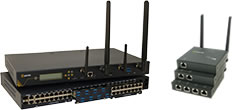
3 security benefits of robust console server setups
By Max BurkhalterApril 29, 2016
Cybersecurity has always been a priority in data center environments, but the situation has escalated as attackers have developed new methods to attack data assets and stay ahead of even the most robust security strategies. One of the major challenges facing businesses is the need to develop robust data protection practices while simultaneously empowering users to work efficiently. Make people jump through too many security hoops, and they're likely to make more mistakes. This is particularly evident when it comes to the remote management of IT assets.
Being able to adjust the IT configuration from anywhere, at any time can be a boon for IT teams trying to maximize uptime and respond to the needs of a 24/7 business world. However, allowing remote access to the network - a key first step in managing the data center from external locations - creates a security nightmare.
Advanced console servers provide secure management of data center assets from both remote and out-of-band connections, making it much easier to keep the data center running at its best. Three security benefits of console servers compared to alternative remote management strategies include:
"Advanced console servers provide secure management of data center assets."
1. Simplified monitoring
Network monitoring has emerged as a vital data center security practice. At its simplest, this comes down to tracking the IP addresses that are on the network and using various points of determination to identify any suspicious users.
The problem is that there are workarounds to many common monitoring tactics. For example, using the source location of IP addresses to identify where users are accessing the network from and figure out if they may be suspicious is an easy way to sift through a large number of users. However, the need to extend IPv4 address available has combined with trends like network virtualization to create a situation where users may have IP addresses that are vastly different than their actual locations.
You can work around this problem by only allowing remote access to people with IP addresses registered in your corporate network, but that can severely limit the flexibility of remote access.
Sacrificing security for convenience isn't an option in the data center, and console servers simplify network monitoring by providing fully secure remote access, offering a direct interconnection that makes it easier to monitor users accessing the network remotely and identify any suspicious behaviors.
2. An added layer of protection
Direct remote access through specialized chips in servers and similar solutions can be effective. However, console server systems add a layer of protection to the network by serving as a secure entry point - meaning users must pass through more system-side checks and balances before getting to data. The complexity here is often hidden from the end-user perspective, but the software and firmware that is monitoring activity on your systems and safeguarding your data now has another layer of protection, making it easier to ensure commands being sent to servers are coming from secure sources.
In many cases, companies will use remote access hardware that doesn't add security to the system, but depends on the other data protection and user authentication tools within your management suites to keep information safe. Having a console server with security systems in place adds a new layer of protection that can be vital when facing sophisticated attacks.
"Cybersecurity strategies are increasingly dependent on being able to adjust and adapt to attacks."
3. Flexibility
Modern cybersecurity strategies are increasingly dependent on being able to adjust and adapt to attacks. As hackers get more sophisticated in the ways they target systems - or simply find more creative ways to get into your configuration unnoticed - IT teams must become more aggressive about shutting attackers out of the network. In many cases, this extends from identifying suspicious behavior to moving data and closing vulnerabilities immediately when a threat is noticed.
The ability to manage the configuration remotely without introducing new security risks through that external connection provides adaptability that can mean the difference between falling prey to an attack and being able to shut out a threat before it does any damage.
Safety without complexity
Console servers with built-in security capabilities provide a layer of security that is easy to manage and simple to maintain. Improving data protection without complexity makes it easier to safeguard against human error and small technical glitches, making security-enabled console servers a key tool in a data center manager's arsenal.
Perle's wide range of 1 to 48 port Perle Console Servers provide data center managers and network administrators with secure remote management of any device with a serial console port. Plus, they are the only truly fault tolerant Console Servers on the market with the advanced security functionality needed to easily perform secure remote data center management and out-of-band management of IT assets from anywhere in the world.



